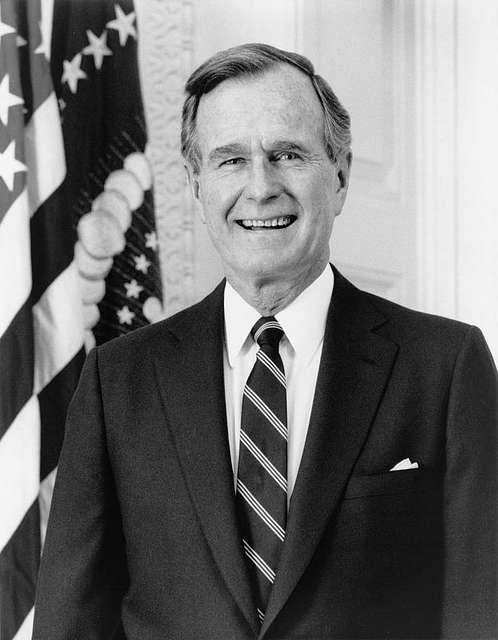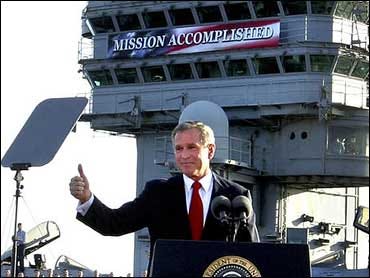By God, we've kicked Afghanistan syndrome once and for all!
Those who remember history are still doomed to repeat it.
Once upon a time, America lost a war — a big war — in Vietnam.
And something funny happened in the aftermath of losing that big war. A lot of Americans decided they weren’t so hot on big wars anymore. America’s leaders started treading a bit more cautiously, or at least tried to give the appearance of doing so. They called that reluctance “Vietnam Syndrome,” as though a reluctance to kill and be killed halfway around the world was some sort of illness.
Then in August 1990 — on my dad’s 38th birthday — Saddam Hussein invaded Kuwait.
President George H.W. Bush put together a multinational coalition that went in and quickly expelled the Iraqi invaders. It wasn’t a completely righteous war — does the world come to Kuwait’s aid if oil isn’t involved? — but even a lot of dovish people don’t want to see bald aggression rewarded. For a brief moment, Bush was one of the most popular presidents in American history.
"By God!" Bush said in exultation. "We've kicked the Vietnam syndrome once and for all!"
I thought about Bush’s “By God!” on Sunday when I read Sen. Lindsey Graham’s interview about Donald Trump’s attack on Iran.
On why Trump acted now
Regarding talks with Tehran, Trump felt Iran was "playing a game" and "didn't think they were genuine." One thing Trump "was thinking about, and I kept talking to him about, is if you do this, you reset the damage done" by the Afghanistan withdrawal by President Biden. "You'll be a new sheriff in town, and this will reset our relationship with the rest of the world. And Israel's done a magnificent job, but we need to have our fingerprints on this too." Graham spoke with Israel Prime Minister Benjamin Netanyahu earlier Sunday.
If Graham is right — and he has been a sidekick to Trump over the last decade — then we didn’t just bomb Iran in order to keep Tehran from getting a nuclear weapons.
We also bombed Iran to show the world who’s boss.
Or, as the late Michael Ledeen once said: “Every ten years or so, the United States needs to pick up some small crappy little country and throw it against the wall, just to show the world we mean business.”
Folks, that’s a terrible reason to drop bombs on other people.
Immoral even.
Thing about the crappy little countries that get thrown against the wall: Sometimes they’re more of a problem than you think they’ll be.
The Iraq story that led this newsletter doesn’t end with Bush’s exultation. A recession kicked in and the next year Americans put Bill Clinton in the White House instead.
Easy come. Easy go.
The United States got bogged down in Iraq over the next decade — not with ground troops, but with sanctions, “no-fly zones” enforced by U.S. fighter jets, inspections designed to limit Saddam’s access to weapons of mass destruction, and the glorious victory melted into a long-term irritation that, oh, by the way, caused a lot of suffering for the Iraqi people.
When 9/11 happened, bunch of Lindsey Graham-style hawks rooted on America to invade Iraq because the hijackers shared a religion and a region and thought throwing Saddam against the wall would make a great show.
And it did. The war seemingly ended quickly:
…except that it didn’t. Thousands of American servicemen — and many more Iraqis — died over the next few years. At the same time, America got bogged down in Afghanistan for almost exactly 20 years.
So you can say that getting over the Vietnam Syndrome helped give us the “Forever Wars” Syndrome, which may well beget Iran Syndrome.
You do wonder how many such illnesses the American Republic can survive.
Maybe this time it will be better. Maybe the mullahs will give up on nukes. Maybe American prestige will be restored. Maybe the militarism of Lindsey Graham and all his hawkish allies will be justified.
But also: Maybe not. The history doesn’t look great, does it?
Postscript
It may be that the attack on Iran turns out to be a great success. Or it may be that we remember the regime as being so incomprehensibly evil that most Americans decide over time that the risk of a long-term war was worth it anyway.
Will I regret taking the dovish position?
Nah. Some of that is personal: I am the son of a conscientious objector, a man shaped by the Mennonite pacifism of my youth.
War is bad.
But also, from another perspective, there is this:
The thing I’ve learned in my lifetime is that there will always, always, always be plenty of cheerleaders for war. There will not always be folks who call for restraint, or for peace.
And peace deserves a little representation. My small voice is all I have to give.








I am one progressive who will not be getting on board with the bombing of Iran.
My regrets to Van for declining his invitation.
Not sure I agree with you, as I have massive reservations about a country like Iran having the bomb, but i applaud your integrity here. For me I’m agnostic as to this attack at present. I guess time will tell one way or the other